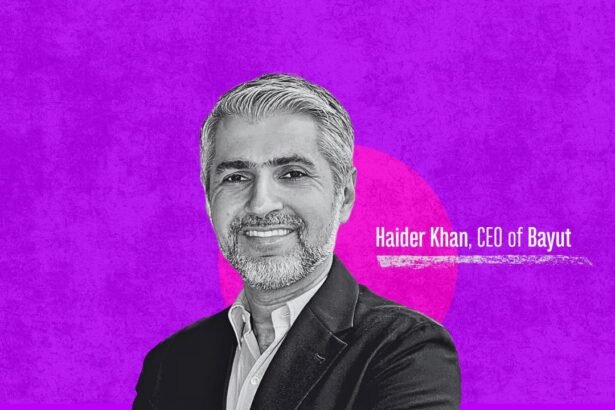In the frenetic, speculative world of Dubai real estate, where the allure of “quick wins” often overshadows diligence, Haider Khan, CEO of Bayut and the Dubizzle Group, uncovered a shocking truth: up to 35% of the market’s digital façade was fundamentally flawed. These listings, lacking proper validation, had to be ruthlessly removed from the platform. For Khan, this was a necessary sacrifice, made despite not being in the company’s “best commercial interest,” because it was vital for the health of the market.
He believed that a stable market could only be built when people make informed decisions based on real data, not just excitement. His goal was to move the market away from being merely a “simple collection of properties with pictures and description” toward genuine transparency.
The Origin Story – From US Tech to Dubai Real Estate
Haider Khan’s professional roots are firmly planted in technology; he is an engineer by profession, holding a degree in Electrical Engineering from the University of Texas at Austin. He spent a significant portion of his career in the tech space in Austin before making the transition to Dubai.
Bayut, the platform he now helms, was initially founded in 2008 by his two brothers. Khan moved to Dubai and officially took the reins in 2014, a time he notes was a kind of “peak of the market” before a prolonged decline leading up to the pandemic.
His reason for taking the leap was simple yet profound: he saw the Bayut platform and felt there was “a lot more that can be done,” particularly concerning data and transparency. Khan sought to build a platform that could truly bring transparency to the market, enabling people to make informed decisions rather than relying on excitement or incomplete information. For him, this increased market transparency is a “true Testament to the stability of the market”. The move also allowed him to be closer to his family and roots at a time when Dubai was rapidly evolving.
The Early Challenge – Building a Better Product
Upon joining Bayut in 2014, Khan faced a highly competitive, yet surprisingly undifferentiated, market. Bayut was late to the game, competing against established players like Dubizzle (which they now run) and Property Finder.
The early state of Bayut underscored the scale of the challenge. The office was small—estimated at 600 to 700 square feet—and the entire team comprised only three people: Khan, a front desk person, and one salesperson.
Coming from a product and engineering background, Khan quickly identified a fundamental flaw in the existing digital property market: most platforms were merely solving the need for the digitization of classifieds, offering a “simple collection of properties with pictures and description”. His guiding principle from day one was to build a superior product.
However, Khan recognized the dual challenge involved in this mission: “it’s not only that you build something better, it’s just going to, you know, fly off the shelf”. Product adoption takes time, requiring immense effort to build the right features, understand the market, and convince users to switch.
The Unification – Creating a PropTech Unicorn
The decisive moment in Bayut’s history came in 2020 when it merged with Dubizzle, creating the Dubizzle Group and solidifying its position as a major regional player—a unicorn.
Prior to the merger, Dubizzle was already a “household name” and a “very sticky platform,” functioning as a general marketplace beyond real estate (including automotive and other categories). The merger discussion arose when the parent company of Dubizzle (Naspers/Prosus) saw Bayut’s potential and product-centric approach at industry conferences.
The acquisition and integration process was unique because it occurred during the height of the COVID-19 lockdown in 2020, requiring extreme innovation. Khan recalls the difficulty of integrating the teams, stating he “couldn’t even meet the develop team” or visit the offices, with initial communication happening over Zoom.
Integrating two businesses meant merging two different cultures and “two different ways of doing things,” necessitating a balanced approach of “give and take on both sides” to establish a unified operational course.
The synergy between the platforms proved highly valuable. Research revealed a remarkably low audience overlap: only 17% of leads were common between the two portals. This meant that over 80% of the audience base was unique to each platform, allowing the Dubizzle Group to amplify its reach tremendously. Moreover, because Dubizzle is a full marketplace, it catches consumers in different phases of their lifestyle journey—for instance, someone searching for baby items might soon be in the market for a bigger home, allowing the platform to target them organically.
PropTech Innovation – Defining the Future of Search
Under Khan’s leadership, the Dubizzle Group, particularly through Bayut, has spearheaded several major PropTech innovations aimed at solving endemic market frustrations and increasing data literacy.
1. Bayut GPT: Recognizing the limitations of static filters, Bayut launched Bayut GPT, a conversational AI tool. This tool allows users to have a natural dialogue, asking complex questions about ROI, rental yields, transaction volumes, and best investment areas. The tool is unique, providing property suggestions and guidance based on the entirety of Bayut’s data universe. Khan notes this conversational approach is what he sees as the future.
2. TrueCheck and Transparency: A persistent frustration for customers is finding listings that are unavailable or inaccurate. To combat this, Bayut introduced TrueCheck. This feature requires a broker to physically visit the listed property and take a geotagged snapshot using the Bayut app, confirming the validity of the property and the agent’s connection to it. Listings that pass the TrueCheck process are visibly promoted, incentivizing broker participation. This commitment to quality has been uncompromising; in collaboration with the DLD (Dubai Land Department), the platform has actively removed or unpublished approximately 30-35% of listings that lacked proper validation.
3. Data and Valuation Tools: Bayut signed an MoU with the DLD to access and refine transaction data, making it digestible for the public. Built on this foundation is True Estimate, a crucial tool providing a digital valuation, rental yield, and comparison data for any given property. This tool has seen tremendous success, with over 50% (reaching about 56%) of ready secondary properties transacted in May 2023 having a True Estimate report generated beforehand, indicating high user trust and reliance on data.
4. Commitment to AI and Future Tech: The company’s focus on innovation is backed by a massive investment in AI and Machine Learning (ML). The organization maintains a large dedicated AI/ML team and operates over 60 proprietary AI models internally. These models drive recommendations, ensure trust and safety (detecting scammers), and underpin valuation tools like True Estimate, which alone runs 8 to 10 AI models. Looking forward, the group is preparing to launch True Scan, a feature allowing users to create precise floor plans and measure property dimensions by simply walking through the space with their phone.
5. Empowering the Broker: Khan is committed to improving service quality across the board. The True Broker Program highlights top-performing brokers within specific communities, helping both buyers and, notably, sellers find trustworthy agents directly. This addresses the challenge sellers face in choosing a single agent, fostering a relationship built on trust and partnership. The recent acquisition of Property Monitor is also aimed at empowering power users (brokers) with richer data—combining Bayut’s behavioral data with transactional records to build better products and knowledge centers.
What is in it for MENA Entrepreneurs !
Haider Khan’s experience offers several concrete pieces of advice for entrepreneurs operating in the MENA region, particularly those in the PropTech and broader service sectors.
1. Reject the Mindset of Quick Wins
A fundamental lesson Khan emphasizes is that there are “just no quick wins in life”. He likens business success to earned income, noting that the “rent is due every day,” demanding continuous effort. Entrepreneurs must approach the business as a “long-term game,” not a speculative flip. This necessitates having a proper business plan and enough capital to sustain operations for an extended period (e.g., six to eight months). He advises new ventures to “crawl, walk, then run,” focusing first on making systems and processes “Rock Solid” before attempting to compete on a larger scale.
2. Prioritize Trust and Client Service
In the real estate sector, where transactions are often the largest purchase an individual makes, trust is paramount. Khan stresses that real estate is ultimately “all about servicing your clients”. Brokers—and by extension, platforms—must act with the client’s best interests at heart, focusing on securing the best deal, not just closing a deal. He suggests the market benefits from a clear separation of representation (a dedicated buyer’s broker and a seller’s broker) to ensure both parties are properly represented.
3. Embrace Self-Disruption Through Technology
Given the rapid pace of technological change (especially the emergence of AI), Khan insists that companies must be proactive. “Embrace technology, right? Don’t be afraid of it… If you don’t do it, somebody else will and they’ll disrupt you”. The goal is to focus heavily on product innovation, as Bayut has done with its 60+ AI models, and to “be part of defining what’s next as opposed to being surprised by what’s next”. They are not afraid of using their own technology to challenge traditional methods, such as the social selling inherent in the True Broker stories.
4. Understand the Investment Value of Real Estate
For prospective investors in the MENA region, Khan provides specific insights, albeit with a personal disclaimer. He notes that real estate in Dubai remains “pretty economical” compared to Western markets where prices have drastically accelerated (sometimes two to three times pre-COVID levels). Key advantages include good rental yields, a functional mortgage system, and the absence of property tax (only service fees are paid). Historically, real estate serves as a strong hedge against global inflation. Crucially, real estate is one of the few assets that generates cash flow. He advises buyers to “do your work, do your diligence, find something good, and then hold on,” leveraging the long-term stability that comes from avoiding short-term flipping. The transformation in Dubai is visible in the holding period, which has moved to an average of 4.5 years, indicating a shift toward long-term investors moving to the region with families.
In conclusion, Haider Khan’s tenure at the Dubizzle Group illustrates how an engineering mind, coupled with an unwavering commitment to data and transparency, can successfully navigate a hyper-competitive market. By building best-in-class, consumer-focused products like Bayut GPT and TrueCheck, and by strategically amplifying reach through the Dubizzle merger, Khan has not only scaled a regional tech giant but has also established a blueprint for digital entrepreneurs in MENA: success is not found in quick flips, but in the deliberate, long-term effort of empowering consumers with knowledge and trust




